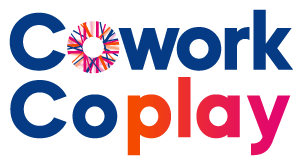A social enterprise
Cowork Coplay was developed to fill a gap…
Tailored career + community programs (with child care) in welcoming spaces.
We offer this program as a key pillar of Human Quotient Group‘s impact. Human Quotient is a certified social enterprise that’s Australian and veteran- and female-led.
What drives us?
Increasing social connection
Without social connection, human struggle. That’s why Cowork Coplay is built around group programs and bringing people together to support and learn from each other.
People finding their meaningful work
Purposeful work is a key aspect of wellbeing. We help people find the time to pursue work projects that matter to them.
Improving gender equity in the workforce
Australia has a skills and capability crisis right now and many fields want more diverse gender balances. Many people would like to work, especially after being out of the workforce due to caring responsibilities. We want to help them find good employers.
Boosting personal and family wellbeing
Functioning individuals increases the chances of having functional families. Parents of small children, and particularly mothers, tend to put everyone’s needs above their own. But that isn’t sustainable in the long term. We want everyone to thrive, no matter their role in a family.
Cowork Coplay Program Lead
Cowork Coplay programs were created by Claire Harris. Claire has channelled her experience in business and entrepreneurship, communication and community building, as well as the lived reality of being a Defence partner (both prior to and after becoming a parent!) to create Cowork Coplay.
The design of Cowork Coplay programs is informed by trends and best-practice in career development, wellbeing, and child engagement.
Cowork Coplay programs are a key service delivered by Human Quotient Group, a veteran- and female-led social enterprise.
Why investing in families is crucial
Why should organisations think about this?
To recruit & retain ADF members (for the security and protection of peace and prosperity) and to offer a good life to all those who serve, including families.
In Australia, there are approximately 40,000 partners of current-serving ADF members and hundreds of thousands of families of ex-serving members.

Unique lifestyle
The partners of ADF members are resilient, adaptable and generally more highly educated than the average Australian. However, they often face many challenges including (refer to Amanda McCue’s work* and other references):
- Career disruptions due to posting cycles and caregiving responsibilities.
- Gender-related barriers, bias & lack of opportunities (~80% of partners are women).
- Caregiving and education: additional burdens on the at-home parent.
- Social Connection: Frequent relocation fragments social and community connections.
- Lack of integration & consistency: Services vary from location to location.
- Mental & physical health including deployments, absences, extra ‘mental load’.
- Finances: Mobility and unpaid work affects dual incomes, savings, and retirement.
Without greater systemic change and investment in innovative programs, some individuals will continue to struggle with the broader barriers affecting their wellbeing and careers.
Plus, industry/government will be missing out on talent. Therefore Australia also misses out.
References
Hamilton, S. (1986) Supporting Service Families. A report on the main problems facing spouses of Australian Defence Force personnel and some recommended solutions, Australia. Dept. of Defence and Office of the Status of Women.
Harris, C. (2022) Defence families in focus at Australian Institute of Family Studies 2022 Conference, blog post, https://www.innovatecommunicate.com/defencefamily-focus-aifs-conference.
McCue, A. (2017) Military (ADF) Spouse Employment & Career Development, A Churchill Fellowship Report, https://careerswag.com/churchillreport.
McCue, A. (2021) Australian Defence Force spouse/partner employment: What has changed in 30 years?, Presentation at Australian Institute of Family Studies (AIFS) Conference 2021, https://aifs.paperlessevents.com.au/share/McCue-59.
Newfield, C., Johnson, A., & Russell, A. M. T. (2022) ‘Desired Employment and Local Social Support: The Strongest Predictors for Well-being Outcomes Amongst the Partners of Australian Military Members’, PsyArXiv. August 18. https://doi.org/10.31234/osf.io/z3xqg.
Tan, C. (2020) Australian Defence Force Families research 2019, https://www.defence.gov.au/adf-members-families/engagement/adf-families-survey.
Contact Us
Get in touch if you want to join us in creating greater access to meaningful work and better community connection.


